“Spotlight” on abuse
Check out my post on 2016 Best Picture winner, “Spotlight” on Creators.co!
Check out my post on 2016 Best Picture winner, “Spotlight” on Creators.co!

Much regarding the story of “Room” has been written about on the Internet already, so it’s probably difficult to avoid reading about how the movie unfolds, but as I read little about it before seeing it, I found that I was better off for doing so. I will talk about the movie in detail, so I’m using the spoiler tag so that some unsuspecting reader won’t stumble into my blog and see something they would have preferred not to before getting into the movie themselves.
***SPOILERS***
 Children often have a different understanding of the world than adults, who gain clarity about certain situations that only comes with experience and age. It’s not wisdom, as a child’s pure, simplistic point of view often contains more wisdom than adults’, as grown-ups often get caught up in rationalization and lived experiences that form a person’s outlook on life. For some things, it’s only once people have grown older that they can gain hindsight on things they experienced as children, especially traumatic experiences, which they then have to learn to deal with.
Children often have a different understanding of the world than adults, who gain clarity about certain situations that only comes with experience and age. It’s not wisdom, as a child’s pure, simplistic point of view often contains more wisdom than adults’, as grown-ups often get caught up in rationalization and lived experiences that form a person’s outlook on life. For some things, it’s only once people have grown older that they can gain hindsight on things they experienced as children, especially traumatic experiences, which they then have to learn to deal with.
“Room” explores the point of view of a 5-year-old boy named Jack, who lives with his mother in a small room, with normal amenities, like a kitchen and indoor plumbing, but is unable to go outside for reasons unknown to the viewer. The boy’s point of view is confined to his own experiences. The room is his home and his entire life. He sees things on TV, like nature and animals and plants and doesn’t know how to make sense of them, because he has never been outside the room to see these things. He doesn’t know any people besides his mother and the mysterious Old Nick who brings the two food and clothes occasionally. But he’s a happy child. He doesn’t have any reason to be unhappy, because he doesn’t know anything other than his own experiences and what Mom teaches him.
That’s why the viewer is better off knowing little about the story before watching the movie. The viewer takes on the child’s perspective, and can only comprehend the situation through their own imagination. The situation is odd. Why can’t the two leave the room? There’s a high-security door on the wall and a skylight and modern appliances, but those are the only clues as to what the world is actually like outside the door. Is this a post-apocalyptic scenario like “Mad Max” where there’s some kind of danger outside? Are these people captives of some sort? Old Nick visits sometimes to drop off food and have sex with Ma on a creaky mattress, which Jack unfortunately has to hear from inside the wardrobe where he sleeps though he probably doesn’t understand what’s occurring. So, seeing the world with the child’s limited understanding makes for a fascinating effect in the minds of the audience.
Eventually, it’s made clear through Ma’s explanation that Old Nick kidnapped Ma when she was younger and locked her in his shed, similar to the women in Cleveland who were kidnapped when they were teenagers and finally got free in 2013, a decade after they went missing. Ma’s dialogue is excellently written in that it makes plain to the audience what the situation actually is, but she attempts to clarify the situation for her child who is unable to grasp the meaning of their situation and why it’s dangerous. Nick becomes gradually more aggressive toward Ma, and he tries to make a connection with Jack, which Ma does not want. So, Ma comes up with a plan to escape, which puts a lot of pressure on Jack, putting him in a very dangerous position without being able to help him fully comprehend any of it. Jack is completely confused and becomes angry with his mother for making him do things he doesn’t want to do. But Ma knows that Jack deserves to live a full life out in the world, not confined to a shed. And despite her plan being unlikely to succeed, succeed it does and mother and child are freed.
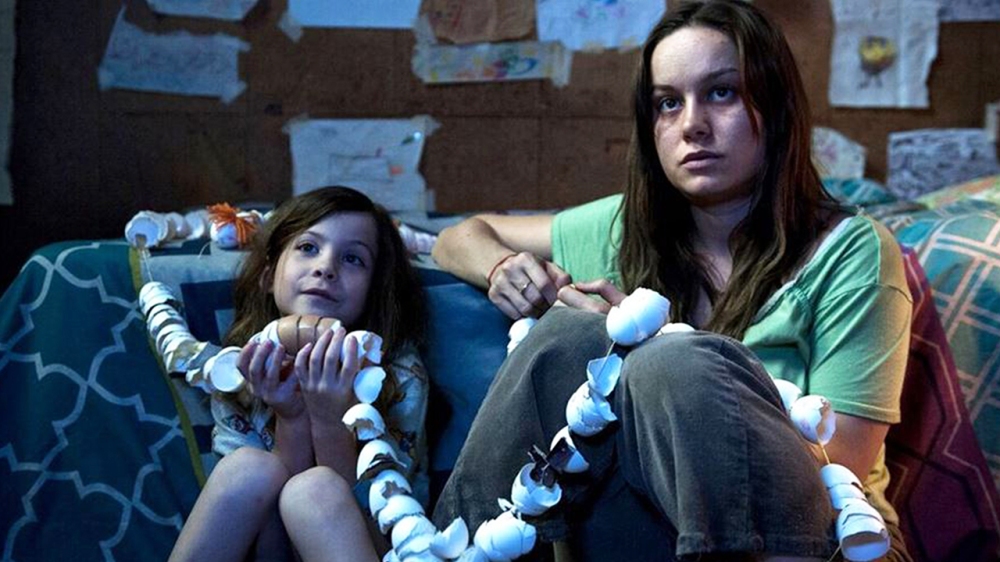
It’s a dire time when you’re making egg shell art. But Jack doesn’t know anything else, so he’s happy.
That’s the first half of the movie. The second half deals with the difficulties of introducing the child to, in his mind, a completely unknown world that most people consider “normal” reality, as well as Ma trying to make a life for herself and Jack after having several years stolen from her being trapped in a shed. This is pretty important because in the news, the average person sees only what the media can show them. The story is one that is easy to sympathize with but seems like it would be impossible to fully understand except for someone who has lived it. Victims try to put their lives back together, and so what they put on display in their public appearances is the best version of themselves that they are able to put forward, without showing the difficulties they face in dealing with psychological trauma and the challenges of reintegrating themselves back into society. It paints a picture of a new perfect life, where those people will never have to worry about that kind of torment again. But as depicted in the movie, it seems likely that there would a lot of traumatic issues those people have to work through.
Jack on the other hand, faces his own trauma which no one around him can understand. He doesn’t know anything about the “real world” and has to adjust to different situations than he’s used to. All he knows about is life in Room. After all, he was born there and he never left until he was five. In escaping, he left his home behind for a strange new place, and he can never go back. He’s sentimental about his memories in Room. That was his life.
The movie briefly touches on dealing with the media blitz, the perpetrator’s arrest and trial, and the internal questions that would haunt someone who lived through such a horrifying ordeal. For Ma, the world has changed since seven years ago. Her parents have divorced for untold reasons, and her mother has remarried. An obvious conclusion would be that they struggled after losing their child and the pain of loss was too great for them to remain together, but there could have been other reasons. Though Dad is grateful and relieved to see his daughter again, there’s some underlying tension there, having a reunion of sorts with his ex-wife and her new husband. The movie doesn’t really go into this aspect in great detail, but it’s OK that many things are left unsaid.
But whereas Ma has to deal with a lot of inner trauma, Jack is just discovering a safe and loving environment with his grandmother and step-grandfather. Though a doctor tells Ma that Jack needs to be monitored psychologically, he’s probably mostly alright, especially lacking the understanding of what he had endured in his life. But oddly, with Jack having lived a life of such simplicity when he was in Room, the massive pile of toys left by well-wishers that would be every kid’s dream doesn’t do anything to excite him. That’s an interesting subtle statement on capitalism and how it clouds people’s view of the world, but more importantly, it shows how far removed he is from the constructed reality of society. It’s almost as is he’s come from a foreign country and has to learn the strange ways of U.S. culture.
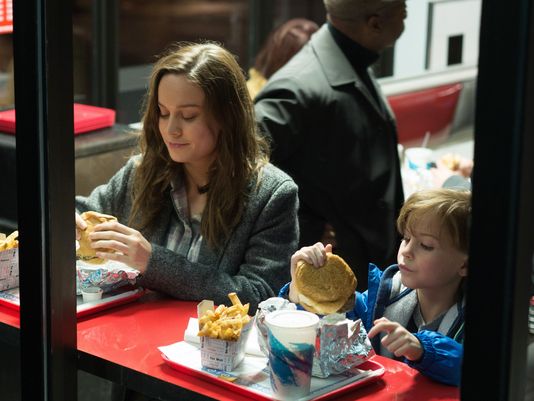
There are so many new things for Jack to try and so many things for Ma to catch up on, once they have escaped Room.
With both Ma and Jack being protagonists, it’s impressive that director Lenny Abrahamson is able to capture the perspective of both characters. Though the audience is always following Jack, especially when the two are separated, when the two are together, the director skillfully and subtly reveals Ma’s story and her emotions, which are distinctive from Jack’s considering their differing points of view, even though they’ve been together for Jack’s entire life. Old Nick is made to appear threatening to the viewer, but still mysterious from Jack’s perspective, even though after revealing who he is and what he has done to Ma, most people would consider him to be a monster (why do the creepy guys always have beards and glasses?). The film’s limited presentation of reality at the beginning and the slow revealing of the truth make it rewarding when the answers unfold.
The acting is top-notch. Brie Larson is nominated for Best Actress for her role as Ma, and it’s well-deserved. She carries the character’s despair in living in a bad situation and her concern for her child’s well-being, yet the hope Jack provides for her just by being there. Though she also feels like it’s necessary for her to have hope for the sake of Jack’s future. Jacob Tremblay is very impressive in being able to carry the film as Jack. Although the actor is a few years older than the character he plays, he seems like a 5-year-old child with a limited, but playful understanding of his life. Larson and Tremblay have amazing chemistry, and it appears they probably improvised a few scenes, which shows how well they probably got along on set. Their interactions come off as very natural and genuine. They look like they have a lot of fun together, as well as times where Ma’s positive veneer cracks and she snaps at Jack verbally. But when the tears start to flow, the loving, motherly instinct immediately takes over again.
The supporting cast is excellent as well. Sean Bridgers plays Nick with enough menace to give the audience a bad feeling about him, but with enough ambiguity about the character’s role to keep the audience wondering who he really is. William H. Macy and Joan Allen are wonderful as always, playing Ma’s parents, as well as Tom McCamus who plays Allen’s character’s new husband.
On top of the great acting is great cinematography. It’s pretty amazing how the crew is able to make the 11×11-foot space appear to be so much more larger than it is in reality at the beginning of the movie when Jack is still naive about his situation, but at the end when the family revisits the place, it looks as tight and small as it is in reality. That really encapsulates Jack’s perspective in a way that words can’t express.
There are a few problems some might have with the film that others might be willing to overlook or see as iffy but not derailing. Ma’s plan to escape from Old Nick seems unbelievable, but the important thing was that she and Jack get out of Room so the story could continue. On the other hand, the low likelihood of its success makes the scene much more thrilling, raising the tension level as the audience waits to see if Nick will see through the ruse.
Once the two escape, the story starts to lose focus and direction, as the clear goal of escaping Room disappears, and it just turns into a depiction of daily life. Conversely, the meandering, lost feeling that part of the movie achieves is probably similar to the frame of mind victims of such kidnapping and detention would have after returning to the safety of home.
Some writers have described the movie as a metaphor for a child’s distorted view of the world that lacks context and understanding and transitioning to something new and different. But the movie doesn’t need to be seen as a metaphor. It can work simply as a narrative, as a thriller, and as a depiction of life off-camera for victims and their family who have gone through such a traumatic, difficult circumstance and made it out the other side. Further, considering the events of the film are very similar to events that have played out in the news in recent memory, it’s a little bit disrespectful and kind of exploitative to use such a horrific story just to make a metaphor or analogy. Whether that was the intention of the director and producers or not isn’t totally clear, but it seems like a poor way to view such a terrible occurrence, especially as the victims of similar real events are known to the public. A movie could still be made about their stories, and a strongly metaphorical movie about a similar, but fictional story would seem distasteful.
Regardless, Abrahamson and company have made a wonderfully compelling film that will take any viewer with a heart through the gamut of emotions, with a perspective that shifts from wondrous and imaginative to brutal, realistic drama. Though it probably won’t win Best Picture, it is certainly deserving of being in that category, as well as all of the categories it’s nominated in. Larson is incredible, Tremblay hopefully has a bright future ahead of him, and the cinematography does a commendable job of telling the story. This film’s nomination is one the Academy got right in a big way, and it should be considered one of the most memorable films of 2015.

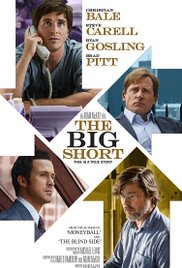 Director Adam McKay is not usually one you find in Oscar-nominated territory. That’s generally the case when your best-known work is Will Ferrell vehicles like “Anchorman” and “Step Brothers,” which are pretty enjoyable goofy comedies in their own right, but not something most people would consider the best movie they saw that year.
Director Adam McKay is not usually one you find in Oscar-nominated territory. That’s generally the case when your best-known work is Will Ferrell vehicles like “Anchorman” and “Step Brothers,” which are pretty enjoyable goofy comedies in their own right, but not something most people would consider the best movie they saw that year.
But everything about “The Big Short” is playing against type. Not just the actors and directing, but even the idea that you could make a comedic movie in Hollywood about a subject as complicated yet dull as the collapse of the housing bubble in the U.S. in the mid-2000s would make Ferrell go on one of his incredulous rants. Good thing he wasn’t involved in this one.
McKay does an impressive job of using his actors to explain to give viewers a vague sense of what the housing bubble was and why it collapsed the U.S. economy, while creating an excellent well-rounded argument for why capitalism is a disaster for everyone except the most fortunate people on the food chain of affluence. He provides a reason for the average audience member to sit through it because there are people they have heard of explaining it, as well as making it an educational experience, sort of. Perhaps even more impressively, it works as a narrative as well, though the comedy is iffy at times.
The film follows Ryan Gosling’s bank executive Jared Vennett, and Christian Bale’s Dr. Michael Burry, and Steve Carell’s Mark Baum, and for good measure, John Magaro and Finn Wittrock as Charlie Geller and Jamie Shipley as the players at the table in the big poker game of the stock market. There are a lot of moving pieces here, and it’s not easy to keep track of them all. McKay manages to distinguish them from one another enough so you can say, Burry’s the crazy genius who doesn’t wear shoes to work and Baum is the guy who is trying to be the “morally upstanding” financial executive.
It’s a gutsy move by McKay to have each of the main actors playing against type. Bale, who has played a wide range of characters but often charismatic ones, is the reclusive, eccentric financial professor who comes up with the idea to essentially bet on the fall of the housing market with his investors’ money. Gosling, usually the handsome nice guy, is the evil banker who latches on to Burry’s idea and spends most of the movie trying to get others to buy in. Carell was an inspired choice to play the straight man in all of this, as he’s usually the funny guy, but has also previously shown a surprising ability for dramatic acting as well.
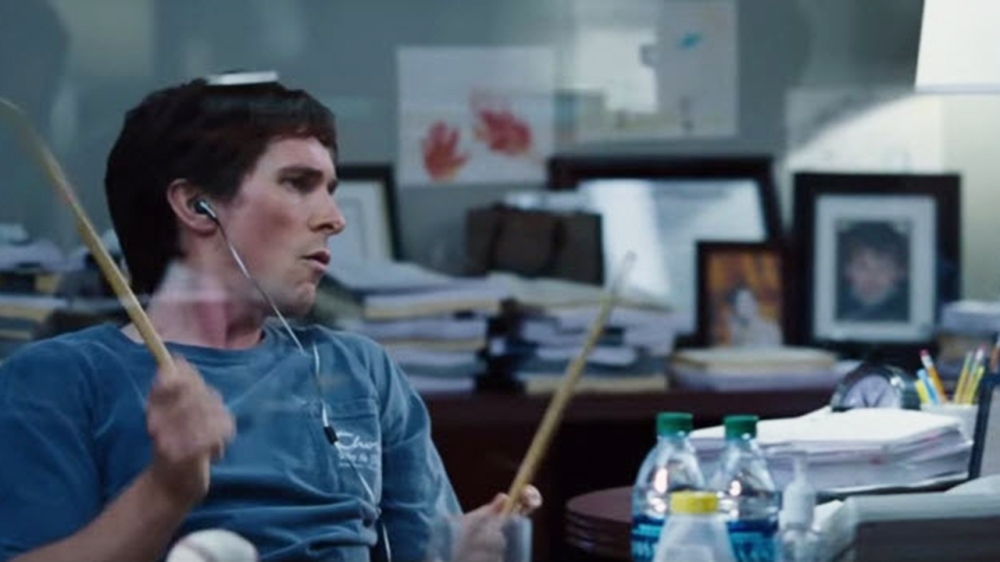
Christian Bale’s character is pretty eccentric in this one.
Also inspired was the movie’s use of the Polyphonic Spree’s cover of the Nirvana anthem, “Lithium,” as it’s a deliriously cheery cover of a rather dour song. Americans were generally happily unaware the events in the movie were taking place, while living in the shadow of Sept. 11 and the subsequent Iraq and Afghanistan wars, and gearing up for the election following George W. Bush’s two terms in the presidency. It was a tumultuous time in the nation’s history, and people who didn’t work on Wall Street had little understanding of what actually occurs there.
It’s not possible for someone who doesn’t really understand the logistics of how the money market works to try and explain it, but essentially, there are a number of interlocking systems in place that govern the way money and stocks are traded. These systems almost have no basis in any sort of reality most people are accustomed to living in, and as such, these systems are easily manipulated and promises are made that can’t even be kept track of, let alone followed up on. There were powerful people who either didn’t do their jobs in keeping financial companies accountable or maliciously tried to destroy the market in order to profit off of it. You know that feeling you get when people tell you something like, “you need to diversify your portfolio” and then they start to explain to you what you need to do with your money that you probably don’t have anyway, as your eyes start to glaze over? That’s the feeling you’re left with after this movie. Characters in the film start to talk about subprime something or others and raising interest piles of shit and things like that, and it’s difficult to follow.
The important thing to note is these are people devoted to making money, and they are willing to do so at any cost, especially if someone else is footing the bill for the endeavors. There’s no honor or morality involved, because those concepts don’t make money. In the early 2000s, the housing market was booming in the U.S., and being able to own a house was considered a sign of success in life. So many people were willing to take out loans so they could live in a house immediately with the knowledge that they would have to ability to pay for it over time. It certainly led many people to enjoy things that were otherwise outside their means, and they weren’t completely made aware of the potential consequences. And since most people didn’t have an aptitude for legal jargon, they signed away their lives in contracts they wouldn’t have understood if they did read them. The movie shows that at every level, there were people who looked the other way over things that made a huge difference for a lot of people, and there were many people at fault when the defaults and frauds began to roll in.
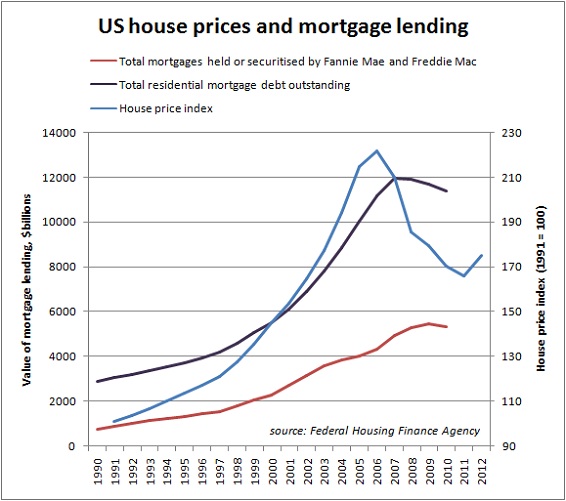
If you had to make the choice between trying to understand charts like this one or watching “The Big Short,” you’d probably want to go with the movie.
Baum acts as a detective of sorts in uncovering all the ins and outs of all this business, talking to people around the country in many areas of business, and those people often reveal that some sort of either willful or unwitting negligence as he himself is trying to wrap his head around what all of it means. He’s trying to to this partly because he feels some moral obligation to keep the market from collapsing because he knows it will harm his clients and people like them. But also, he’s doing it in part because he has directed his company to buy into Burry’s plan to bet against the market, and he wants to know how it will work. Baum is the closest thing to a hero you will find in this movie, but like a presidential candidate, his likability only goes as far as his complicity in profiting from the same things he is supposedly against.
Part of the point is that the system doesn’t make sense. If you want to look at the problem of financial inequality in the U.S., it’s incredibly frustrating to watch these people manipulate something so nebulous as a housing bubble to become billionaires, while other people get evicted from their homes because they unawarely bought into a purposely broken system. McKay does a good job making that connection, as one character serving an eviction warning meets a family who is renting a house and has no idea that the owner is not paying their loan, and juxtaposing the boardroom wheeling and dealing with real news footage of poor people taking shelter under a bridge.
The film involves the characters attempting to navigate these murky waters and come out on top, while through their interactions, explaining this big, complex situation for the audience through their natural dialogue with one another. As most of the actors, especially Gosling and Carell, are beloved and fun anyway, watching the movie kind of like that cool economics professor in college who always came up with the best jokes and witty illustrations to explain things that have nothing to do with whatever you studied unless you happened to be studying business. There’s some stuff with Baum’s brother committing suicide that attempts to give the film some moral human gravitas, but it kind of gets lost amid trying to explain tranche opportunities and CDOs and what not.
Meanwhile, Magaro and Geller are pretty fun as small fund managers trying to get in on the big money that financial giants like JPMorgan and Bear Stearns are playing with, especially in their interactions with a strongly bearded Brad Pitt’s living off-the-grid retired money expert Ben Rickert, mostly because Pitt, again playing against type, is shot from out of nowhere talking about growing his own plants with real dirt and urine, and the importance of his yearly colonic appointments. Pitt’s dry humor gives the film its best moments of comedic relief, which is very much needed with the alternately heavy and brain-busting subject matter.
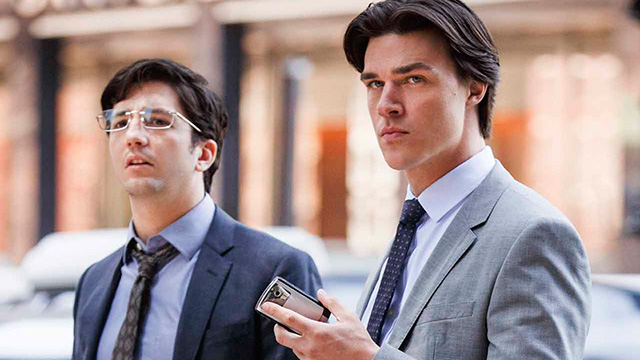
John Magaro and Finn Wittrock make a splash as “small” financiers trying to break into the big money.
The editing is also impressive, as it turns the movie into kind of a collage of sketches where the characters running through their narrative, personalities appearing as themselves to offer analogies on complex money concepts, bright and flashy (in a good way) montages, and a collection of candid newsreel from the mid-2000s.
But the movie’s biggest selling point from an entertainment perspective is also somewhat of a limitation. That is, there are many movies that these actors are in that are much more enjoyable to watch about things that are much more interesting than the stock market. It’s an important film about a very important topic, but it’s hard to see how most people would actually be willing to take the time to sit down and watch it.
The comedy, aside from Pitt and a few other scenes, mostly feels tacked on, as McKay kind of goes for the faux-documentary style of the U.S. version of “The Office,” with characters winking at the camera in private and offering their odd commentary after a major event goes down in the room, but here it usually falls flat. Some non-major characters have quirks that they bring up repeatedly like one side character who is fixated on food when he travels. It’s nice that McKay attempts to keep the movie light against heavy, dense subject matter, but it’s also a weird contrast that doesn’t always work. It’s not like the rapid-fire, constant spontaneous joking and silliness that’s smoothly woven into the story like in “Anchorman.” Certainly, what McKay was attempting with “The Big Short” required a more strongly directed, focused approach, but that’s also why some of the humor is kind of distracting rather than relieving.
Then there’s a somewhat racist joke Vennett makes about a Chinese mathematician, which the mathematician explains away to paint Vennett as a buffoon. But Vennett isn’t a stupid character, his strong negative characteristic is his willingness to take advantage of people to make money. So, it’s really just a poorly thought out joke that does more to strengthen stereotypes about Asian people than whatever it was intended to do.
But the biggest problem with the film is that each element is only OK or pretty good, and there isn’t a strong anchor point to tie it all together. The narrative is not bad, but there are so many different people the movie follows, which makes it complicated to keep them all straight. Pitt is pretty funny, but otherwise the comedy is hit-or-miss. The acting is good but all of the major actors have had stronger work and none of them get enough focus because there are so many components. It’s not a bad movie, but it feels like there’s too much going on for it to be great.
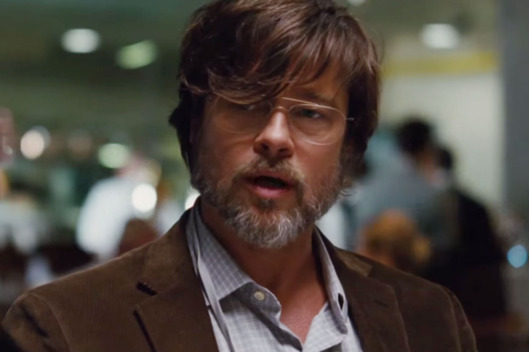
Brad Pitt is the bear in Bear Stearns.
So if you’re not interested in the political aspect of the film, then it’s not going to do much for you. It’s kind of like watching a fireworks show while your friend is trying to finely detail the evils of capitalism for you. The fireworks are pretty, but there’s nothing about them that will make them stand out from every other fireworks show you’ve seen, and you feel like your friend has something really important to say, but it’s just going in one ear and out the other. Gosling, Carell, and Bale are enjoyable and they put on good performances, but they also aren’t anything mind-blowingly special. Sure, the editing is cool, but if you want to watch a movie for the editing, there are other good ones out there about things other than money.
McKay has to assume that most people who would see this movie are already aware that Wall Street is corrupt, and this is an attempt to show the audience just how corrupt it all is. That’s important, but at the same time, it’s something that’s so foreign to the vast majority of people. So a lot of it might be lost on many, except to show that the average person basically has no control over many aspects of their own lives, because there are people with a lot of money and power who trade those aspects of their lives like poker chips. On the other hand, it does highlight the importance of people being more wary of loans before they sign those papers with the small print.
Perhaps the most damning thing this movie reveals is that while Bush’s government was in part responsible for the economy failing, it was Barack Obama’s government that offered bailouts to those companies that orchestrated its fall, and much of those hundreds of millions of dollars went into the pockets of a small number of people who were already well-off to begin with. That’s enough to make any highly conscious voter lose faith completely in the entire capitalist system, as well as the government. For people who live outside of the U.S., this is why you don’t want capitalism.
The frightening thing is, unlike many movies based on true events, the events are portrayed pretty accurately, even down to Burry’s eccentricity. The movie is actually based on a non-fiction book by the same name, written by financial journalist Michael Lewis. This is kind of where you hope the director and the studio actually had embellished things to make the movie more dramatic, but that wasn’t the case here. The movie is pretty balanced in that, despite its focus on Wall Street, it places equal blame on everyone involved. It’s good that a filmmaker is willing to devote his energy and resources to making a movie explaining this to the average person, but the implications are pretty depressing.
“The Big Short” seems like an important film that’s hard to recommend. It seems like the best place for it to be shown would be an off day in a college basic economics course, but for business people, it would go against their entire life purpose, so it really doesn’t even fit there. People invested in the Oscars will see it, and they might be some of the few who do. McKay has always had subtle political commentary in his ridiculously silly films, and it was a bold move to try to tackle such a complicated but pervasive subject while attempting to inject it with his trademark humor. But it could also be a tough sell for audiences. For people knowing what they’re getting themselves into, it could be rewarding, but those looking for pure entertainment value might find themselves wishing they went to see “Star Wars” again.

Oscar season is upon us once again, so it’s time to examine the Best Picture nominees in all their whiteness.
——————————————
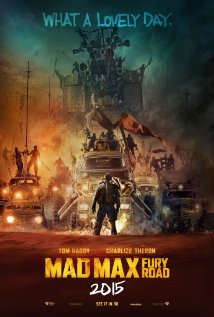 Returning to a once-acclaimed franchise that’s last iteration was released 30 years ago and not well received is generally not a recipe for success at the box office, and especially not when it comes to raking in awards. But that’s what George Miller did, and holy hell was it worth the wait that no one realized they were waiting.
Returning to a once-acclaimed franchise that’s last iteration was released 30 years ago and not well received is generally not a recipe for success at the box office, and especially not when it comes to raking in awards. But that’s what George Miller did, and holy hell was it worth the wait that no one realized they were waiting.
There have been a few big-budget action films to make it into the Best Picture category in recent years, and since the category was expanded to allow for more than five entries each year, there has usually been one that crept up into the nominees. But for the most part, they have seemed to be a nod from the Academy that, yes, they are hip and with the times, and they do know how to have fun, but also not too much.
The difference with “Mad Max: Fury Road” is that there was major buzz about the movie coming out of film festivals, which other than perhaps Quentin Tarantino movies, rarely happens for mainstream films. It’s as if the film had been raging inside Miller for those 30 years and he finally got the chance to unleash it, and what came out was a volcanic eruption of a movie that the Pompeiians hadn’t seen coming when Miller was working on such awe-inspiring titles as “Happy Feet” and “Happy Feet 2.”
Then there was also the negative hype surrounding the movie when word got out that it played out as “a feminist piece of propaganda posing as a guy flick,” according to men’s rights activism website Return of Kings, which presumably has nothing to do with the similarly named third installment of “the Lord of the Rings” trilogy. Indeed, Miller had hired “Vagina Monologues” author and feminine activist Eve Ensler as a consultant for the movie, as he had planned to include pro-woman social commentary into his movie about cars chasing each other and explosions. But then again, that kind of “negative” attention is more of a “positive” for most well-meaning people, and the spite serves as just another motivator to make the trip out to the theater, on top of all the critical acclaim. And despite “Max” needing to be a guy flick, who would have guessed that women could enjoy movies as well as men can, and men are also able to watch movies that star women?

What it feels like to read a men’s rights activist piece.
As in previous “Mad Max” movies, other than the original, Max is a man living in a world where society has devolved into gangs prowling the desert and worshipping the gods of chrome (. He has a certain simple moral code: his first objective is to survive, but second is to help those in need. As such, he doesn’t have his own story, as much as he helps groups of people who are being oppressed by powerful people. The oppressors in “Fury Road” are led by Immortan Joe (a growly Hugh Keays-Byrne) the human incarnation of patriarchal regime, who controls all the area’s water, which is the world’s most valuable resource along with gasoline (here known as guzzoline). He also “owns” women, keeping the young, attractive virginal ones for breeding purposes, and older, larger ones for harvesting breast milk. But under his command is Imperator Furiosa (Charlize Theron), who is secretly plotting to set the breeding women free.
Max isn’t exactly a willing participant in this slave drama, as he is caught by scavengers under Joe’s command who nourish themselves through their captives’ blood, since presumably they are told they don’t need food, as Joe and his buddies probably take all of that for themselves considering how they handle the water situation. As such, Max finds himself fashioned into a human blood bag, and eventually as a hood ornament, once Joe’s regime has discovered Furiosa’s plot and scrambled all vehicles. But once Max breaks free, he finds himself tentatively aligned with Furiosa’s cause, though it takes some convincing.
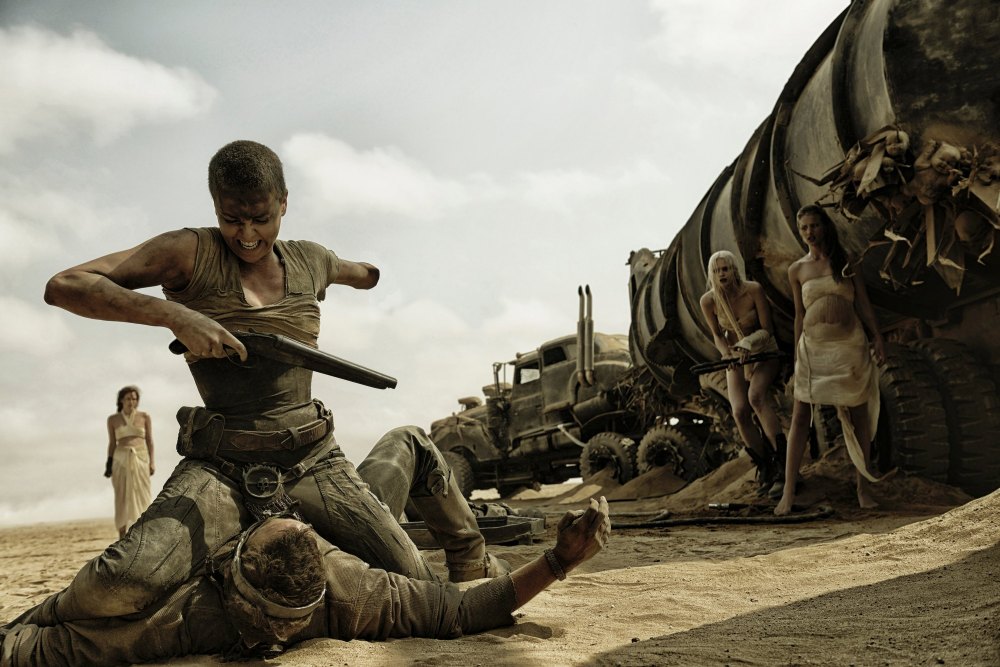
Max hands the focus of the movie to Furiosa, as he generally plays a supporting role in “Mad Max” movies. It takes some convincing for Max to work with Furiosa.
Also along for the ride is Nux, one of Joe’s boys, who has a slavish devotion to Joe, like his fellows, and the life goal of dying in battle in Joe’s service so they can reach the mythical spiritual realm Valhalla. He just so happens to have the misfortune of making Max his blood bag, and since Max isn’t exactly new to this sort of thing, spells bad times for young Nux. Nicholas Hoult makes Nux vicious, yet sympathetic as he winds up tagging along with Furiosa, Max, and the slave women after Joe rejects him for being “mediocre.”
Of course, it wouldn’t have worked on a number of levels to bring back onboard a then mid-50s Mel Gibson, so Brit Tom Hardy moves into the simple role, which he handles just fine. He carries the same sense of hard-nosed skepticism that eventually gives way to compassion. It’s not a demanding role, but Hardy is always enjoyable. But really, it’s Theron’s movie, as she’s just as much the star, and for what her part is, she works in her role, but again, it isn’t exactly demanding.
The real star of the movie is the action, and it’s as many reviewers have said, possibly the Sistine Chapel of action movies. It may sound dubious whether that title deserves any distinction, but compare this to movies by Michael Bay or even JJ Abrams. It’s possible to put a good effort into making a crowd-pleasing action flick that is well-produced, tells a good story and has charismatic, entertaining actors, and make it successful, and crowds flocked to theaters in 2015 to see “Star Wars,” “Jurassic World,” and “Furious 7.” Then again, it’s also possible to make garbage like the many “Transformers” movies and people will see those too. But it’s obvious that Miller loved doing his job in creating his masterpiece “Max.”
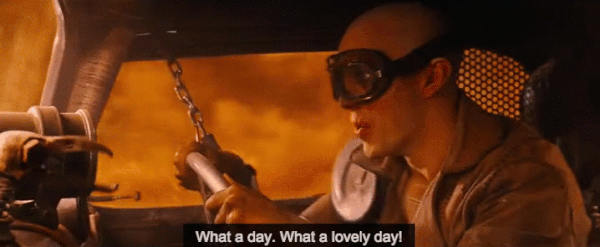
He hasn’t really deviated from the other “Mad Max” movies here, so much as he’s like a kid who’s got all these new technological toys to play with in the 2010s that he didn’t have in the ’70s and ’80s. The car battles have never looked so vibrant, and the rumble of engines has never been so enveloping, and the speed and danger and lunacy of those chases have never been captured with the clarity and impact that has been accomplished here. And Miller’s use of color and lighting is breathtaking. The sandstorm scene is awe-inspiring, as many suicide-happy scavengers are swept up into the heavens by swirling sand. The lightning combined with the sand shielding the sun bathes the characters and their cars in a deep red hue, as Nux declares “Oh, what a day… what a lovely day!” It’s only one of a number of gorgeously morbid scenes the evil genius Miller cooked up in his film lab. It makes one wonder how awesome “The Road Warrior” might have been if it was made today.
And there’s a Doof Warrior. You can’t go wrong with a guy strapped to a car whose sole purpose is to play a guitar that shoots flames as a means of inspiration and intimidation. Then there are other characters with ridiculous names like The Bullet Farmer and the Organic Mechanic and Rictus Erectus.
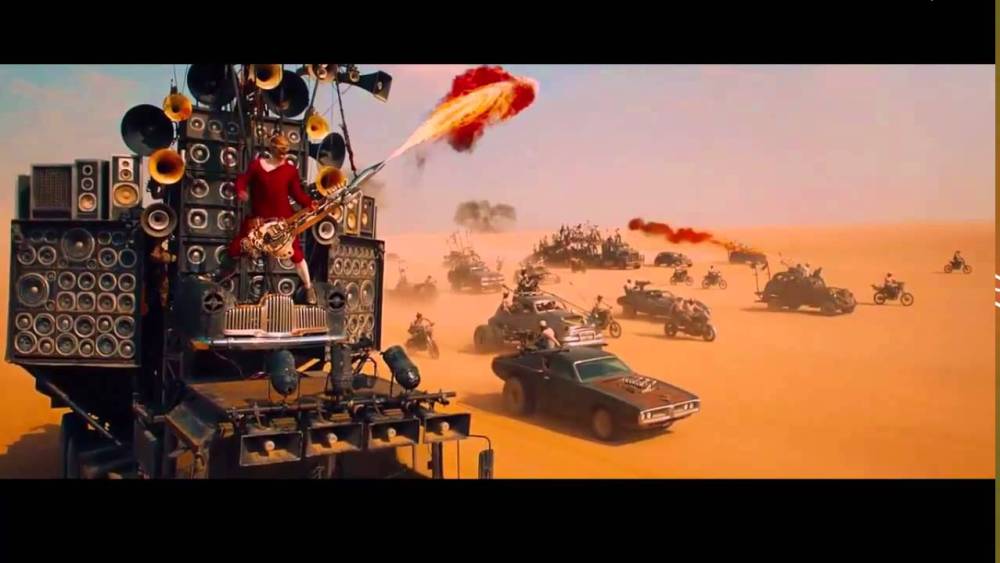
It’s definitely the first Best Picture nominee to feature a Doof Warrior or a guitar that shoots flames.
On top of that, much of the action, especially anything involving Max is filmed in fast-motion, in a nod to one of Hollywood’s early filmmakers, Charlie Chaplin. Despite the grisly subject matter, Miller’s filming technique keeps the movie lively and light, an important part of any great political satire, as Charlie himself was no stranger to. There are also visual references to Stanley Kubrick’s “Spartacus,” a film not-so-coincidentally revered for its visuals and commentary about human slavery.
Oh, the political satire! Beyond the incredible visuals and sound lies a biting commentary on the state of gender relations. Just judging by the fact that there is such a thing as a “men’s rights activist,” anywhere in the world, but especially in a country that has never had a female president and where the most popular religion generally demands gender roles and the heterosexual nuclear family be strictly adhered to, shows that despite progress toward equality for all, there’s still a long way to go before people are actually treated equally. And though claiming that “masculinity is being increasingly punished and shamed in favor of creating an androgynous and politically-correct society that allows women to assert superiority and control over men” seems like an extreme and astoundingly ignorant position to hold, the fact is there are many who believe it, which is why websites like Return of Kings are still propagated. And despite many people’s efforts to create a society and world more friendly to women, in some way the belief that men are superior and entitled is still ingrained in everyone deep down, even in women, because that’s what public opinion subtly (and sometimes not so subtly) still teaches.
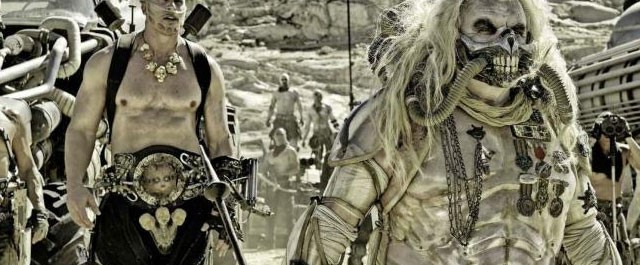
Immortan Joe has his game face on, and he wants his women back!!
“Fury Road” is not so subtly an allegory for those people specifically, but for a patriarchal world in general. Women are treated as sexual objects and breeders, and though a feminist and pro-woman sense of justice and morality is trying to rise to the top or flee the patriarchal world, angry men holler about losing their “property” and are in hot pursuit ranting and raving the entire way about a return to the good ol’ days when women were ideally barefoot and pregnant in the kitchen. Meanwhile, there are lots of self-proclaimed “good guys” laughing off the MRAs’ behavior, calling it infantile in one breath, but in the next breath making rape jokes about Bill Cosby’s victims and calling his probable victims liars because such an intimate form of violation is nearly impossible to prove in a court of law, while also complaining about too much “political correctness” in society.
It’s so great that Miller has taken this feminist critique of the world and wrapped it in possibly the greatest action movie ever, with the fascinating world he created, and made it a “Mad Max” film to give it visibility for general audiences. That didn’t translate into success at the box office on the other hand, only cracking the top 20 in both domestic and worldwide ticket sales. The other pro-woman, male geek-enraging action sci-fi film of the year, “Star Wars,” had a better performance. It turns out a sequel 30 years later for a lesser-known series that ended with a clunker, along with an R-rating made it kind of a tough sell.
Regardless, it would have been a minor injustice if “Mad Max: Fury Road” had not landed a best picture nomination, and as the Academy has been more open to including action films, it would have been a severe oversight if somehow this film didn’t make the field. But “Star Wars” with its record-breaking box office certainly had to be a possibility to steal the traditionally sole sci-fi/action slot. Thank the voters for going with a film that was greater on every other level. The pro-feminist commentary likely helped to push it over the top, as that’s something the Academy usually goes for. It doesn’t seem likely that “Max” will be taking home the shiny hood ornament for best picture, though it would be an excellent selection for that honor. It should sweep the technical awards, and Miller probably has a shot at best director since Alejandro Inarritu is practically disqualified this for “The Revenant” since he won last year for “Birdman,” and no one wins two years in a row. Whatever the case, it’s great to see such a daring film get recognition.
Now Miller better get started working on the next one. We can’t afford to wait another 30 years.
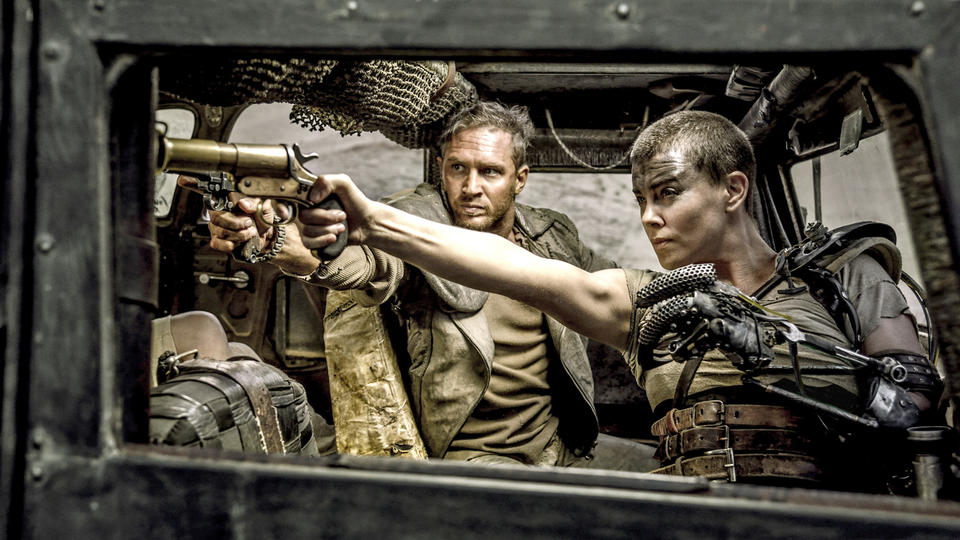
Men and women can work together as equals, who would have guessed?